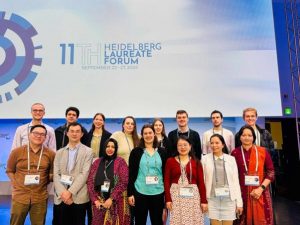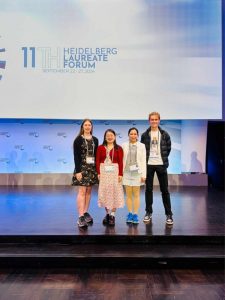Bethany Caldwell
UniSA
11th Heidelberg Laureate Forum Report
I was lucky enough to be invited to the 11th Heidelberg Laureate Forum from September 23rd to 27th. This annual event brings together 200 young researchers like myself and recipients of the Abel Prize, ACM A.M. Turing Award, ACM Prize in Computing, Fields Medal, IMU Abacus Medal and Nevanlinna Prize for a week of networking and workshops.
Where are you in your career?
I am a final year PhD student at the University of South Australia.
Why did you want to attend the HLF?
During my PhD, I have focused on becoming an expert in my niche area of mathematics. To become a well-rounded researcher, I hope to gain more knowledge of research happening outside of my expertise. Since this forum brings together a large group of young researchers and laureates from all areas of mathematics and computer science, it was an amazing opportunity to learn about the most recent work from those shaping the future of these disciplines.
Tell us about your research
My research focuses on mathematical optimization with a specific interest in optimal control, projection methods and the intersection of these areas. My thesis mainly focuses on solving continuous time linear-quadratic (LQ) optimal control problems with control and state constraints. These are infinite-dimensional optimization problems that, in general, cannot be solved analytically. The common approach to solve these is to apply a numerical method employing a solver such as AMPL-Ipopt; first discretising the problem and solving the resulting large-scale finite dimensional problem numerically.
In my thesis we instead apply an innovative methodology where we ‘split’ the problem by rewriting it as the minimization of sum of two functions and then apply a projection method. Though these methods are popular in the optimization community their application to optimal control problems (especially continuous-time optimal control problems) is new in the literature and is the focus of my thesis. To apply these methods one needs the projections, or more generally the proximal operators, for these functions which are challenging to derive for these problems. My research provides the projection expressions for several LQ optimal control problems as well as a numerical scheme for approximating these projection expressions in more challenging cases.
Favourite application of your work?
My work focuses on the applications to problems with a specific structure which allows me to apply this work to a variety of problems. This includes simple problems such as a double integrator or mass spring system and more complicated problems such as a milling machine tool manipulator or honing machine tool manipulator.
Though my PhD research has interesting applications to problems from a variety of disciplines, my favourite application is from my honours research about a generalized Newton method for solving systems of nonlinear equations. By applying this method with a range of starting points one can create beautiful artwork. At the Heidelberg Laureate Forum, I showcased such an image in the Intercultural Science-Art Exhibition. I applied Newton’s method to a system of two nonlinear equations appearing from a signal processing application. Using a grid of starting points, I assigned a different colour to the point depending on the number of iterations taken by the method to converge from that starting point. The darker the green, the less iterations taken by the method from that starting point while the gold points did not converge in less than 15 iterations.
If you could meet any laureate, who and why?
If I could meet any laureate, it would be Maryna Viazovska. She won the Fields medal in 2022 for her work on sphere packing problems making her only the second woman to win this prestigious award. As someone in optimisation I am fascinated by her work.
Caption 1: A photo of the city of Heidelberg taken from Heidelberg Castle.
Caption 2: A group photo of (almost) all the attendees from Australia.
Caption 3: A group photo of this year’s AMSI-AustMS Heidelberg Laureate Forum Travel Fund recipients. From left to right myself, Jie Xu, Lien Thuy Nguyen and Joshua Peters.
Caption 4: Myself with my submission to the Intercultural Science-Art Exhibition.




